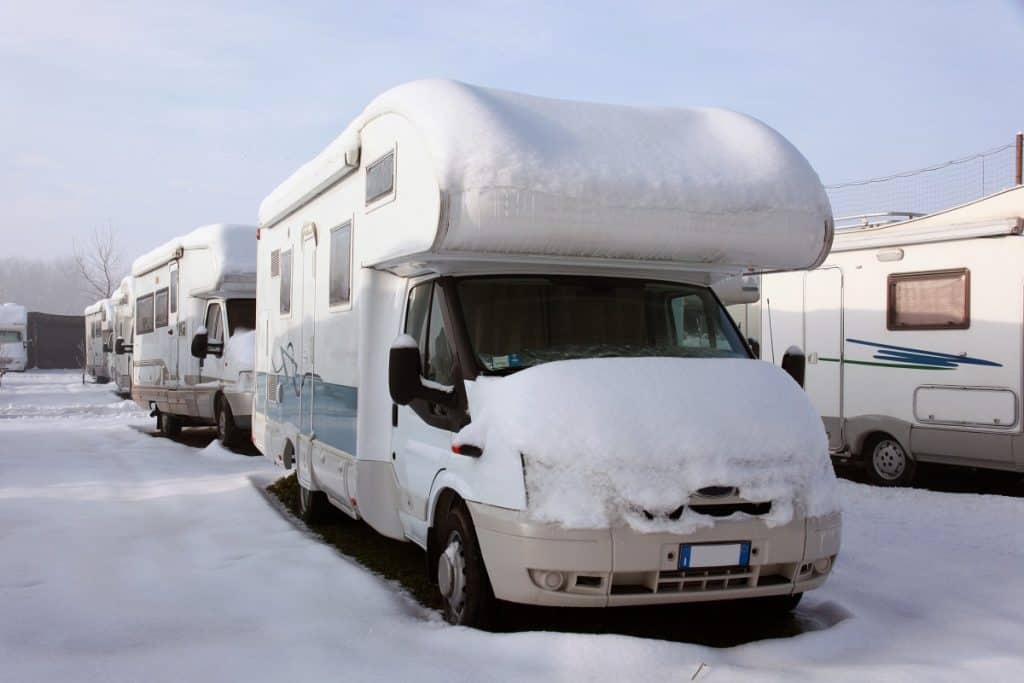This post contains affiliate links.
Almost every RVer is going to have to winterize their unit at some point, and once the winter passes you’re probably going to be wondering how to dispose of RV antifreeze. You may also be worried about how well antifreeze will do with your home septic system. Septic tank repairs are costly, and the last thing you want is to unwittingly damage your system.
RV Antifreeze is not harmful to septic systems if used properly, however you cannot use regular automotive antifreeze without causing damage.
I’ll discuss the difference between regular/automotive antifreeze and RV antifreeze, how to safely dispose of it and some alternatives you can use to antifreeze. I hope to leave you feeling confident that you’re using and disposing of antifreeze properly while offering some tips and tricks along the way.
To discover more about winterizing your RV check out our article, How to Winterize an RV.

Table of Contents
Can RV Antifreeze Safely Be Drained Into a Septic or Sewer System?
Antifreeze is a catch-all term for any substance that lowers the freezing point of water. This means that even in conditions where water would normally freeze (32 degrees Fahrenheit/0 degrees Celsius or lower), the water stays a liquid until much colder temperatures are reached.
Commercially available antifreeze is generally labeled for RV use or automotive use, and the difference is significant. The active ingredient in automotive antifreeze is often ethylene glycol, while in RV antifreeze it’s either ethanol or propylene glycol.
While ethylene glycol and propylene glycol may sound similar, they have very different properties. The main difference is the level of toxicity of each. While you shouldn’t go around drinking propylene glycol by any means, you’re much less likely to do any damage by ingesting small quantities. It’s safe enough that it’s included in many cosmetic items.
Ethylene glycol, on the other hand, is very poisonous despite being very sweet tasting. This is the unfortunate reason many pets get sick after getting into antifreeze in the garage or shed, and it’s something you want to keep far away from your RV’s water supply.
Aside from being toxic, ethylene glycol is also damaging to a septic system. It has the potential to kill off the good bacteria working in your septic tank while the phosphates in the solution can simultaneously cause an overgrowth of the drain field bed’s biomass.
The propylene glycol or ethanol used in RV antifreeze, however, are both safe for your septic system and won’t cause any damage when used in appropriate quantities. In other words, I wouldn’t go dumping a whole bunch of antifreeze in there for the fun of it but you’ll be safe flushing your winterized RV water system, for example.
If you’re not convinced, you can dump small amounts of RV antifreeze on the ground without having a large impact on the environment. You never want to do this with automotive antifreeze, but ethanol and propylene glycol are safe enough in small quantities that you won’t do any damage.
Having said that, the most environmentally conscious approach would be to dump it in a septic system or sewer system so that it’s more contained, and you never want to dump antifreeze directly into a stream or other water source.
No products found.When and How Do You Use RV Antifreeze?
If you’re venturing into below freezing temperatures for any length of time or you’re storing your RV for a long while, you’re going to want to winterize it. Winterizing keeps your RV’s water pipes from freezing which can cause line and fitting breaks, and winterizing saves you some maintenance work while it’s stored.
In order to winterize your RV, you’ll first want to dump your gray and black water tanks and drain your freshwater tank and water heater, you can read how to do that in our article How to Winterize an RV. If you have an inline water filter you’ll want to bypass it or remove it from the system.
Once that’s done, open the low point drains on the hot and cold lines and turn on all of the faucets (both hot and cold). Flush the toilet at the same time and this should force all of the water out of the plumbing. You can use your water pump to help, but be ready to turn it off as soon as it goes dry to avoid damaging it.
As soon as the system is clear you can take your foot off the toilet flusher and cap the low point drains. Turn off all the faucets, then use the bypass kit, if your RV has one, to bypass the water heater.
If your RV doesn’t have one you can install one, or you can use the extra 6-8 gallons of antifreeze that will have to go through your water heater before it gets into your system. This isn’t recommended for your water heater or your wallet, and then you’ll have to dump all that antifreeze. Your best bet is to bypass it altogether. Bypass valves are readily available from Amazon and pretty easy to install.
- Save Antifreeze: Camco’s Supreme Permanent RV Hot Water Heater Bypass Kit efficiently bypasses your camping water heater, saving 6-10...
- Compatibility: Perfect for 6-gallon RV water heater tanks, this camper accessory fits 1/2″-14 NPT tapered threads and includes durable...
- Install Permanently: Mount this camper essential once to eliminate repeated disconnections and speed up every RV winterizing session.
Now you can use a water pump converter kit to pump in the antifreeze or disconnect the inlet side of the pump and replace it with a hose that goes into the jug of antifreeze. Either way, you’re ready to put the antifreeze into your system.
Turn the pump on, and then slowly turn on the faucets closest to the pump until pink antifreeze appears. Do this for every faucet, your toilet, and your shower – working your way away from the pump.
Now pour a cup of antifreeze down every drain and flush a cup down your toilet. Close all faucets and turn off the electric water heater switch to make sure it doesn’t accidentally come on while you’re winterized.
- Simple Boat/RV Winterization: Attach this camper winterizing kit to your water pump to efficiently circulate antifreeze through your...
- Kit Includes: This winterizing kit comes with (1) durable brass 3-way valve, (1) siphon tube for effortless RV/ boat antifreeze transfer,...
- Fit & Compatibility: Installs in-line with any water pump featuring 1/2"-14 NPT or NPSM ports, offering effortless connection & a seamless...
Are There Alternatives to Using RV Antifreeze?
Will RV antifreeze harm a septic system? No. Is it the only thing you can use to keep your pipes from freezing? Also no. You may be surprised to learn that more than a few RVers use washer fluid instead of antifreeze – I sure was. Washer fluid is often cheaper than RV antifreeze and is also rated for lower temperatures, but I would advise against using it as a full replacement when winterizing.
First, RV antifreeze is designed to do its job, which is to flow through your RV’s water system. It’s hard to say whether your pump will react as kindly to washer fluid over time, and washer fluid is also more likely to use methanol and ethylene glycol as their antifreeze ingredients – both of which are highly toxic. They also shouldn’t be dumped in your septic system.
If you do decide to use washer fluid, it’s best used in your drain traps and holding tanks. This way you still get the benefits on the back side of your system without having to worry about contaminating your water supply. Pour a cup of washer fluid down each of your drains and in your toilet and you should be good to go.
Another option to consider is clearing out your water system entirely. If there’s nothing there, there’s nothing to freeze. This is done by getting an air compressor and a special plug that you can find at most RV stores. This is our preferred method of winterizing our RV water system.
Just like winterizing with antifreeze you’ll drain everything and bypass the water heater, but instead of hooking up the water pump to the antifreeze next you’ll connect the special blow out plug to the city water inlet.
Fire up the air compressor keeping it below 30 psi and let it run until there is no more water in the drain valves and faucets. Then disconnect it, drain your tanks, and use antifreeze or washer fluid in your drains to winterize your tanks and traps.
The main disadvantage to the blow-out method is you can’t be entirely sure you got all of the water out. This can be a costly mistake, but many RVers use this method with no problems to get through the winters. Read more on how exactly we use compressed air to drain our waterlines here.
How Much RV Antifreeze Should You Use?
No matter the size of your rig, the ultimate answer to this question is you shouldn’t use more antifreeze than you need. Like I said above one of the biggest ways to avoid using excess antifreeze is to bypass your water heater, and then from there you should only run your faucets with antifreeze in the system until you see it start to come out.
The typical RV will use 2-3 gallons of antifreeze to run through the water system. Very big or very small rigs will have some variance, but this is a good starting point. You’ll also have to figure in the antifreeze you put down your drains and p-traps, and it’s always good to have a little extra on hand just in case.
One other thing that’s nice about antifreeze is that it’s reusable. You can grab a bucket and catch the antifreeze as you drain it from the RV and save it for next year which will help cut down on cost. Just make sure you use a filter to get any small particulates out of it before you put it back into your RV’s system.
Closing Thoughts
Is RV antifreeze safe for home septic systems? It certainly is. Antifreeze is the most common solution used to winterize RVs, and as long as you use it sparingly and use the right kind you won’t have any trouble with your septic system or sewer system when you drain it.
Recommended RV Winterizing Products
- Essential RV Winterizing Kit: 10-piece kit contains all the products you need to prepare your RV for winter storage
- Winterize Your RV's Plumbing: The Premium Ban Frost 2000 antifreeze concentrate, blow out plug and hand pump kit help winterize your RV's...
- Keeps Your RV Smelling Fresh: Mini dehumidifier, refillable dehumidifier moisture absorber, hanging dehumidifier and fridge door stay help...
- DIY RV Winterizing Kit: Easily safeguard your RV’s plumbing with Camco’s Antifreeze Hand Pump Kit. It lets you swiftly pump antifreeze...
- Effortless Winter Prep: Transform the winterization process into a simple task. This RV winterizing pump kit streamlines the procedure,...
- Essential Winterization Gear: Includes (1) hand pump, (1) inlet tube, and (1) flexible outlet tube for easy connection to your travel...
- Save Antifreeze: Camco’s Supreme Permanent RV Hot Water Heater Bypass Kit efficiently bypasses your camping water heater, saving 6-10...
- Compatibility: Perfect for 6-gallon RV water heater tanks, this camper accessory fits 1/2″-14 NPT tapered threads and includes durable...
- Install Permanently: Mount this camper essential once to eliminate repeated disconnections and speed up every RV winterizing session.




